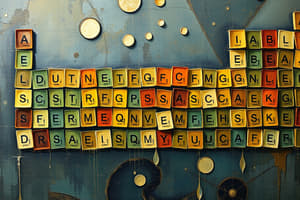Podcast
Questions and Answers
What is an alloy?
What is an alloy?
- A mixture of elements with non-metallic properties
- A mixture of elements that has metallic properties (correct)
- The simplest ratio of ions in a compound
- An ion with a positive charge
What is an anion?
What is an anion?
An ion that has a negative charge
What is a cation?
What is a cation?
An ion that has a positive charge
What is a chemical bond?
What is a chemical bond?
What is a crystal lattice?
What is a crystal lattice?
What are delocalized electrons?
What are delocalized electrons?
What is an electrolyte?
What is an electrolyte?
What does the electron sea model describe?
What does the electron sea model describe?
What is a formula unit?
What is a formula unit?
What is an ionic bond?
What is an ionic bond?
What are ionic compounds?
What are ionic compounds?
What is lattice energy?
What is lattice energy?
What is a metallic bond?
What is a metallic bond?
What is a monatomic ion?
What is a monatomic ion?
What is an oxidation number?
What is an oxidation number?
What is an oxyanion?
What is an oxyanion?
What is a polyatomic ion?
What is a polyatomic ion?
Flashcards
Alloy
Alloy
A mixture of metals, either substitutional (similar sizes) or interstitial (small atoms fit between larger ones).
Anion
Anion
A negatively charged ion crucial for forming ionic compounds.
Chemical Bond
Chemical Bond
A force that holds atoms together, either through positive-negative ion attraction (ionic bond) or nuclear-electron attraction (covalent bond).
Ionic Bond
Ionic Bond
Signup and view all the flashcards
Metallic Bond
Metallic Bond
Signup and view all the flashcards
Crystal Lattice
Crystal Lattice
Signup and view all the flashcards
Lattice Energy
Lattice Energy
Signup and view all the flashcards
Delocalized Electrons
Delocalized Electrons
Signup and view all the flashcards
Electron Sea Model
Electron Sea Model
Signup and view all the flashcards
Formula Unit
Formula Unit
Signup and view all the flashcards
Monatomic Ion
Monatomic Ion
Signup and view all the flashcards
Polyatomic Ion
Polyatomic Ion
Signup and view all the flashcards
Oxyanion
Oxyanion
Signup and view all the flashcards
Electrolyte
Electrolyte
Signup and view all the flashcards
Oxidation Number
Oxidation Number
Signup and view all the flashcards
Ionic Compounds
Ionic Compounds
Signup and view all the flashcards
Study Notes
Definitions of Key Terms in Ionic Compounds and Metals
- Alloy: A metallic mixture, can be substitutional (similar atom sizes) or interstitial (smaller atoms fit between larger ones).
- Anion: A negatively charged ion essential for forming ionic compounds.
- Cation: A positively charged ion that plays a crucial role in ionic bonding.
Bonding Concepts
- Chemical Bond: A force holding atoms together through positive-negative ion attraction or nuclear-electron attraction.
- Ionic Bond: The electrostatic force between positively and negatively charged ions in ionic compounds.
- Metallic Bond: Attraction between metallic cations and delocalized electrons, contributing to metallic properties.
Structural Characteristics
- Crystal Lattice: A three-dimensional arrangement of ions where each positive ion is surrounded by negative ions, affecting the compound's shape.
- Lattice Energy: The energy needed to separate one mole of ionic compound ions; influenced by ion size and charge.
Unique Electron Properties
- Delocalized Electrons: Electrons that freely move among metal atoms, characteristic of metallic bonding.
- Electron Sea Model: Concept that describes how valence electrons are shared among metal atoms, explaining malleability, conductivity, and ductility of metals.
Types of Ions
- Formula Unit: The simplest ratio of ions in an ionic compound, providing insight into its composition.
- Monatomic Ion: An ion formed from a single atom, carrying a charge based on electron loss or gain.
- Polyatomic Ion: A group of two or more atoms bonded together that carries a net charge, common in various compounds.
- Oxyanion: A specific type of polyatomic ion consisting of a nonmetal element bonded to oxygen atoms.
Other Important Concepts
- Electrolyte: An ionic compound that conducts electricity when dissolved in water, highlighting its importance in chemical applications.
- Oxidation Number: The charge of a monatomic ion, indicating how many electrons have been lost or gained during ion formation.
- Ionic Compounds: Formed by ionic bonds, these compounds exhibit unique properties due to the strong attractions between their constituent ions.
Studying That Suits You
Use AI to generate personalized quizzes and flashcards to suit your learning preferences.
Description
Test your understanding of ionic compounds and metals with this flashcard quiz. Dive into terms like alloys, anions, and cations to reinforce your knowledge. Perfect for students studying chemistry and looking to prepare for their exams.




